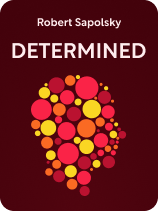

This article is an excerpt from the Shortform book guide to "Determined" by Robert Sapolsky. Shortform has the world's best summaries and analyses of books you should be reading.
Like this article? Sign up for a free trial here.
Are you tired of feeling guilty for your actions? Is that feeling justified? What if you’re not responsible for what you do and say?
In his book Determined, Robert Sapolsky explores the concept of determinism and its implications for personal responsibility. He challenges our traditional notions of praise, blame, and punishment in a world with no consequences for our choices.
Keep reading to understand Sapolsky’s thought-provoking ideas about human behavior and accountability.
No Consequence of Praise or Reward
If free will doesn’t exist, then by definition people aren’t responsible for their own actions. Sapolsky says that, if we follow that line of thought to its conclusion, it suggests that there should be no consequences, whether good or bad. People shouldn’t be praised or rewarded for the things they accomplish, and they shouldn’t be blamed or punished for what they do wrong.
Sapolsky addresses praise and reward first, and he acknowledges that this is a logical conclusion if determinism is true. However, he also recognizes that this goes against human nature in several crucial ways:
1) It goes against our natural drive to compete. This doesn’t just mean our drive to prove that we’re better than our peers, but also our ancient drive to compete for resources. Why do anything if we won’t be rewarded for it? For instance, why enter a competition if there’s no trophy to win? Why go to work if we won’t get paid? Again, what’s the point of doing anything?
(Shortform note: The anticipation of getting something you want—whether it’s a paycheck, an award, or just the satisfaction of reaching a personal goal—is one of the most powerful motivators in human psychology. As psychiatrist Daniel Lieberman and educator Michael Long explain in The Molecule of More, this is because of a chemical called dopamine. Your brain releases dopamine when you’re expecting a reward for doing something, which motivates you to go and do that thing. Therefore, if there’s no expectation of a reward, you’re unlikely to have that dopamine rush driving you to work hard; the lack of dopamine would create the feelings of pointlessness that Sapolsky discusses here.)
2) It goes against our natural desire for recognition. We want our efforts to be recognized and our accomplishments to be praised. If nobody’s going to be proud of us—including ourselves—then what’s the point of achieving anything?
(Shortform note: To illustrate just how strongly some people feel about the need for recognition, some free will skeptics have talked about abusive and threatening emails they’ve received. For example, philosophy professor Galen Strawson had to go to the police after receiving several threatening messages from somebody who was enraged over Strawson’s claim that people aren’t responsible for their own achievements. In their first email, the sender specifically accused Strawson of trivializing everything that any of his loved ones had ever accomplished.)
3) It goes against our natural need for control. We like to believe, and centuries’ worth of culture have taught us, that we can take control of our lives through discipline and hard work. Therefore, we naturally resist the idea that we’re not in control and never can be. It’s hard to accept that all of our hard work and everything we’ve achieved are just our winnings from some cosmic lottery.
(Shortform note: Mental health experts say that control over one’s life—or more accurately, having a feeling of control—is an important part of overall well-being. Someone who doesn’t feel like they’re in control is likely to become stressed and anxious, or alternatively to develop feelings of helplessness and depression. Furthermore, numerous studies suggest that this tendency is hardwired into our genes. This suggests that we have an inherent need to feel control over our lives, in much the same way that we have an inherent need to feel love and a sense of belonging.)
The Point: The Common Good
As you’ve just seen, a common concern about a deterministic world is that there seems to be no point to doing anything, since you won’t get recognition or rewards for what you accomplish. In response, Sapolsky offers two reasons why your efforts would still be worthwhile: a selfish motivation and a selfless one.
From a selfish perspective, anything that improves the world around you will also make your own life better. For example, working to keep your neighborhood clean would improve your quality of life, even if nobody personally thanks you for it.
(Shortform note: Stoic philosophy presents another way that making the world better also makes your own life better: In Meditations, Roman emperor Marcus Aurelius says that working for the common good is the only way to live a happy and fulfilling life. Aurelius’s reasoning is that in order to feel fulfilled, you must have a consistent goal and spend your life working toward that goal. However, people are naturally inconsistent; your personal desires and goals will change frequently. Therefore, any fulfilling goal must be for the good of all, rather than directed toward your ever-changing personal interests.)
From a selfless perspective, Sapolsky argues that if you’re concerned about praise and rewards in the first place, then you’re almost certainly coming from a position of relative privilege. This is because people who have to scrabble for basic necessities like food and shelter don’t have the luxury of worrying about such things.
Therefore, the author urges you to improve the world, not for your own benefit, but for the benefit of people who are less fortunate than you.
(Shortform note: In The Selfish Gene, biologist Richard Dawkins discusses selfish and selfless behaviors in nature. Dawkins uses game theory to predict the outcomes of various behavioral patterns in a hypothetical animal species and concludes that the best possible outcome happens when all members of that species act selflessly. This means that the animal population would grow to its maximum possible size, with all members having access to the resources they need to thrive. Sapolsky is making a similar argument here, saying that selfless actions will create the best possible outcomes for humanity as a whole.)
No Consequence of Blame or Punishment
While many people won’t want to give up on getting rewarded for what they do, Sapolsky says that the opposite side of this issue (giving up on blaming and punishing people for wrongdoing) will also spark fierce resistance. One major reason people will cling to the idea of accountability is that human brains are hardwired to search for answers. This is to say, we naturally want to know why something happened and what we should do about it.
(Shortform note: The human instinct to seek out patterns and solutions has been a crucial survival strategy throughout history. The ability to recognize patterns (like which plants were poisonous, which animals were most aggressive, and the signs of inclement weather) allowed our ancestors to recognize danger and avoid it. This pattern recognition also helped them to devise solutions to problems, such as creating better tools for hunting and building shelters for themselves. Therefore, the twin drives to analyze and problem-solve are deeply ingrained in human nature.)
Unfortunately, we also tend to look for answers that are simple and satisfying. So, when something bad happens, we start asking simple questions: who’s to blame (why it happened) and how we should punish them (what we’re going to do about it). Compounding this issue is the fact that, in many cases, it seems obvious that a person is responsible for what happened, and seeing them punished satisfies our sense of justice.
For example, if your car is stopped at a red light and someone rear-ends you, of course you’re going to want to blame that other driver for the accident and demand that they pay for any damages. Determinism says that the crash was the inevitable result of myriad different factors, and therefore the other driver isn’t responsible. Unfortunately, that answer is both complicated and unsatisfying, so your mind is likely to resist it.
(Shortform note: Just like our tendency to seek out solutions in the first place, our attraction to simple answers goes back to our ancient ancestors. As historian Yuval Noah Harari explains in 21 Lessons for the 21st Century, prehistoric humans lived in small, relatively isolated tribes. This means that we’ve evolved to understand simple and small-scale problems, like conflicts between people or between tribes; we still struggle to grasp large, complex issues. Therefore, people tend to take mental shortcuts, like labeling someone as “bad” and assigning blame to that person, rather than trying to comprehend the countless things that influenced their actions.)
With all of this said, Sapolsky gives a partial counterpoint to himself: Rewards and punishments would still make sense to the extent that they can influence people’s behavior. For instance, if you punish a child for breaking something, that child will probably be more careful in the future—it isn’t fair, but it’s effective nonetheless.
| Punishing Bad Behavior Makes Good Behavior Possible Recall our earlier commentary about universally selfless behavior leading to the best possible outcomes for a species. Dawkins (The Selfish Gene) goes on to say that while this strategy is best in theory, it’s not actually practical. The most stable strategy is retaliation: This means acting selflessly by default, but turning aggressive toward individuals who show selfish behavior—in other words, punishing them. Retaliation is necessary because in a truly selfless population, the rare selfish individuals would take advantage of the majority; they’d hoard far too many resources for themselves while not contributing anything back. Therefore, applying this same principle to human behavior, a deterministic society would still have to punish selfish people in order to show that such behavior won’t be advantageous. |
Corollary: A Rehabilitation-Focused Mindset
One major concern about a world without free will is that it would be a world without accountability. After all, if criminals’ actions aren’t their own fault, then don’t we have to simply let them go free to commit more crimes? However, Sapolsky argues that’s only true if the purpose of the legal system is to punish criminals. Instead, he says, its purpose should be to protect society and work for the common good.
With that shift in mindset it would still be possible to imprison criminals because doing so protects other people and upholds order in society—there’s no need to believe that people choose to commit crimes and should be punished for it. However, Sapolsky adds that the focus of imprisonment would have to change from punishment to rehabilitation: giving people the skills, resources, and (if necessary) treatment to do better after they’re released.
As before, drawing a parallel to computers can help to illustrate this point. When a programmer realizes that their program isn’t acting the way it was intended to, they simply patch the code to eliminate that problem. Rehabilitation is like a software patch for people.
On the other hand, it would be absurd for a programmer to just put a glitchy program into a locked folder and hope it decides to change its behavior. Such an approach could never work because the problem is in the software’s programming, not its “choices.” And yet, that’s exactly what the legal system does by imprisoning people.
| The Data Is Clear: Rehabilitation Works We can support Sapolsky’s ideas here with real-world data: Studies have almost universally found that rehabilitation programs lead to much lower recidivism rates than punitive imprisonment. In fact, some studies have found that punishment-focused approaches could be counterproductive and actually increase people’s chances of reoffending. The idea behind punishment is that it provides an incentive for people to make better choices in order to avoid future consequences. However, if free will doesn’t exist, then the concept of “choice” becomes a moot point. Furthermore, many people turn to crime because they believe they have no other option; it’s the only way for them to survive in the face of poverty, lack of education, and limited opportunities. This means that even if their actions weren’t predetermined since the beginning of time, those actions were predetermined by their personal situations. Therefore, while we might never know if Sapolsky’s reasoning about free will is correct, his conclusions are certainly supported by data: Treating criminals as if they had no choice in their actions, and providing them with the skills and resources to do better in the future, is a much more effective approach than just punishing them. |

———End of Preview———
Like what you just read? Read the rest of the world's best book summary and analysis of Robert Sapolsky's "Determined" at Shortform.
Here's what you'll find in our full Determined summary:
- Why some people believe we have free will—and others don’t
- Three implications of a world without free will
- Why we should live as though free will doesn’t exist (even if it does)






